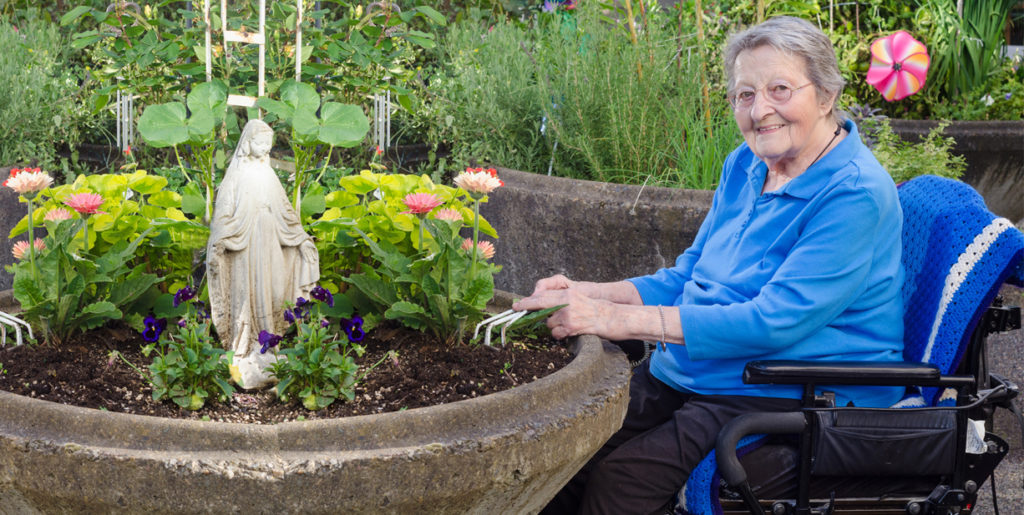Providing Supportive Senior Home Care in North Vancouver and West Vancouver.
Call us at 778.989.8872
Compassionate Care at Home
Exceptional home health care tailored to your loved ones needs, offering comfort and support where they belong at home. Welcome to the Compassionate Care at Home Corner! At Holistic Total Care, we believe that home is where compassion flourishes, and we are dedicated to illuminating the beauty of caring within the familiar walls of home. Here, we share heartwarming stories, practical advice, and insights into the power of personalized care. From nurturing independence to providing specialized support for unique needs, our aim is to create a safe place where empathy, kindness, and support converge. Come along on a journey with us as we uncover the meaningful impact of compassionate care, enhancing lives and creating a nurturing environment within the comforting embrace of home.

Effective Strategies for Connection Between Clients and Caregivers
-Recognize that Care Begins with Attentive Listening
-Cultivate Patience in Your Interactions
-Establishing Trust and Security
- Exercise Patience in Approaching clients
-Promoting Compassion
-Bring Unexpected Joy to Their Experience and Stories
January 01, 2024
Building Timeless Bonds
Create meaningful connections with a loved one with dementia by integrating activities that tap into cherished memories and foster a sense of nostalgia. Engage in housebound activities by creating a memory book with old photos, tending to house and garden plants, listening to favourite music, watching beloved shows or movies, working on puzzles and indulging in arts and crafts like painting, drawing, knitting, or crocheting together.


Embracing the Dementia Journey
Explore the heartfelt journey of supporting loved ones with dementia. Discover the power of empathy, understanding, and the strength found in journeying together on this unique path. At Holistic Total Care, we delve into the heartfelt journey of supporting loved ones with dementia. We focus on understanding, empathy, and creating a supportive space for our clients on this unique journey. Our caring caregivers, along with our client's families, navigate this path together, embracing compassion and fostering a safe environment of support and empathy. By following these principles, caregivers can create a more empathetic and supportive environment for individuals living with dementia. These strategies focus on positive communication and minimizing stress and confusion for both the individual and the caregiver.
Agree,Never Argue: Instead of arguing, try to agree with their reality. It can help avoid frustration and maintain a positive atmosphere.
Redirect, Never Reason: If they seem upset or confused, gently redirect their attention to a different topic or activity rather than trying to reason with them, which may cause frustration.
Distract, Never Shame: When faced with challenging situations, distract them with a more positive or engaging activity. Avoid shaming or criticizing, as it can be detrimental to their well-being.
Reassure, Never Lecture: Reassure them and provide comfort instead of lecturing. Lectures may lead to confusion and anxiety, while reassurance can offer a sense of security.
Reminisce, Never Say "Remember": Engage in reminiscing about the past without explicitly asking them to remember. This can trigger positive memories and create a more positive interaction.
Repeat, Never Say "I Told You So":Be patient and willing to repeat information. Avoid expressing frustration or saying "I told you so," as it may lead to feelings of inadequacy.
Ask, Never Command: Use a gentle and supportive tone when making requests. Asking instead of commanding helps preserve their sense of autonomy and dignity.
January 11,2024

Enhancing Lives With Our Services
We provide compassionate support, ensuring comfort and well being for your loved ones in the familiar surroundings of their home. At Holistic Total Care, our dedication to enhancing lives is at the core of everything we do. From providing compassionate companionship to offering specialized care for seniors and individuals with disabilities, we take pride in offering a holistic approach. Our services encompass tailored assistance for daily activities, medication reminders, meal preparation, transportation, and night care, ensuring round-the-clock support. Whether it's dementia and Alzheimer's care, post-hospital support, or palliative care, our commitment remains unwavering—to empower and enrich lives through personalized, attentive, and compassionate home care services.
January 24,2024

Brain Boosting Activities for Seniors' Health
Puzzles and Games: Engaging in puzzles like crosswords, sudoku, card matching games, Chess or jigsaw puzzles can stimulate the brain, improve problem-solving skills, and enhance cognitive function.
Revitalizing Past Hobbies: playing a musical instrument, painting, or gardening, keeps the brain active and engaged.
Physical Exercise: Regular physical activity benefits not only the body but also the brain. Activities like walking, swimming, or Tai Chi not only increase blood flow to the brain but also support the growth of new brain cells and improve cognitive function.
Socializing: Maintaining social connections and engaging in activities with friends and family can help reduce feelings of isolation.Additionally, such interactions stimulate the brain, and improve overall mental well-being.
Reading books, newspaper and magazine: Reading regularly stimulates the brain, improves vocabulary and comprehension, and can help prevent cognitive decline in older adults.
Mindfulness and Meditation: Practicing mindfulness meditation can help reduce stress, improve focus and attention, and promote overall brain health in seniors.
Brain Training Apps: There are various apps and online programs specifically designed to train and stimulate the brain, improving cognitive function, memory, and problem-solving skills.
Healthy Diet: Consuming a balanced diet rich in fruits, vegetables, whole grains, lean proteins, and healthy fats provides essential nutrients that support brain health in seniors.
Creative Expression: Engaging in creative activities such as writing, drawing, pottery or crafting can stimulate the brain, promote emotional well-being, and improve cognitive function.
Stimulating Senses: Incorporating activities that engage the senses can have profound effects on the mental well-being of seniors.
Incorporating these brain-boosting activities into their daily routine can help seniors maintain cognitive function, memory retention, and overall mental well-being as they age. It's essential to encourage a variety of activities to keep the brain stimulated and engaged.
February 22, 2024

Stimulating Senses for Senior Mental Wellness

Seven simple activities to enhance quality of life and bring joy through safe workouts with your elderly loved one

Engaging and Enjoyable Activities for Seniors Living with Dementia,Enhancing Quality of Life Through Meaningful Interactions
Engaging activities are essential for older adults with dementia as they can help stimulate their minds, improve mood, and foster social connections. Here are some fun and beneficial activities tailored for individuals with dementia:
Card Matching: Matching games can help stimulate cognitive function and memory. You can create a simple card matching game using large, easy-to-see cards with images of familiar objects, animals, or symbols.
Play Dough: Play dough is a versatile and tactile activity that can provide sensory stimulation and encourage creativity. You can provide different colours of play dough and simple tools like cookie cutters or rolling pins for them to manipulate and shape.
Untying Knots: Working with materials like ropes or strings to untie knots can be a great way to improve dexterity and hand-eye coordination. You can provide ropes of varying thickness and complexity for them to practice on.
Watching Documentaries: Watching documentaries can be both entertaining and educational, offering insights into various subjects and cultures. Choose documentaries on topics they are interested in or that feature familiar places or events from their past.
Arranging Flowers: Flower arranging is a calming and creative activity that can provide sensory stimulation and a sense of accomplishment. You can provide a variety of flowers, foliage, and vases for them to arrange into beautiful bouquets or centerpieces.
Cooking or Baking: Simple cooking or baking activities, such as making no-bake cookies or preparing sandwiches, can engage the senses and provide a sense of accomplishment. Additionally, focusing on tasks that are safe and manageable for their skill level ensures a positive and enjoyable experience.
Animal Therapy: Interaction with therapy animals, such as dogs or cats, can provide comfort and joy. Furthermore, even watching fish in an aquarium or birds outside a window can be calming and entertaining.
Stopping to Smell the Roses: This activity involves taking a moment to appreciate the beauty and fragrance of flowers, which can be calming and provide sensory stimulation.
Preparing Afternoon Tea: Hosting an afternoon tea session involves brewing tea, arranging snacks, and creating a social gathering around the enjoyment of food and drink.
Creating Photo Albums: This activity involves organizing photos into albums, reminiscing about past memories, and fostering connections through storytelling.
Enjoying Conversational Connections: Engaging in conversations with others can stimulate social interaction, communication skills, and memory recall.
Empowering with Makeup: A comforting beauty routine can offer seniors a sense of pampering and rejuvenation while fostering memories from their youth. Moreover, encouraging them to engage in makeup at their own pace, allowing them to participate in enhancing their sense of well-being and dignity, and reminisce about past experiences with cosmetics.

Thriving Through Holistic Total Care; Empowering Seniors with Healthy Home Nutrition
A Guide to a Healthy Diet for Seniors in the Comfort of Their Own Home
As we age, maintaining good health becomes increasingly essential, and diet plays a crucial role in this endeavour. For seniors receiving home care, adopting a holistic approach to nutrition can significantly enhance overall well-being. By incorporating a diverse range of nutrient-rich foods and considering individual preferences and needs, seniors can enjoy optimal health and vitality. Here's a guide to crafting a healthy diet tailored for seniors receiving care at home.
Embrace Nutrient-Dense Foods
The foundation of a healthy diet for seniors lies in consuming nutrient-dense foods that provide essential vitamins, minerals, and antioxidants. Encourage a variety of colourful fruits and vegetables, whole grains, lean proteins, and healthy fats. Opt for:
- Fruits and Vegetables: Include a rainbow of fruits and vegetables to ensure a wide range of nutrients. Berries, leafy greens, citrus fruits, and cruciferous vegetables are particularly beneficial for seniors due to their high antioxidant content.
- Whole Grains: Choose whole grains like brown rice, quinoa, oats, and whole wheat bread over refined grains to boost fiber intake and promote digestive health.
- Lean Proteins: Incorporate lean sources of protein such as poultry, fish, tofu, beans, and legumes to support muscle strength and repair.
- Healthy Fats: Include sources of healthy fats such as avocados, nuts, seeds, and olive oil to nourish the brain and heart health.
Prioritize Hydration
Dehydration is a common concern among seniors and can lead to various health issues, including urinary tract infections and cognitive decline. Encourage adequate fluid intake by offering water, herbal teas, and hydrating foods like soups, fruits, and vegetables throughout the day.
Individualize Dietary Needs
Each senior has unique dietary requirements based on factors such as medical conditions, medications, allergies, and personal preferences. Work closely with healthcare professionals and registered dietitian to tailor meal plans that meet individual needs while ensuring optimal nutrition and enjoyment.
Promote Digestive Health
Digestive issues can become more prevalent with age, impacting nutrient absorption and overall well-being. Incorporate foods rich in fiber, probiotics, and prebiotics to support digestive health. Yogurt, kefir, fermented vegetables, whole grains, and fiber-rich fruits and vegetables can aid in digestion and promote gut health.
Encourage Mindful Eating
Encourage seniors to practice mindful eating by savoring each bite, chewing slowly, and paying attention to hunger and fullness cues. This approach can help prevent overeating, improve digestion, and enhance the enjoyment of meals.
Monitor Medication Interactions
Certain medications can interact with foods and nutrients, affecting absorption and efficacy. Stay informed about seniors' medication regimens and collaborate with healthcare providers to address any potential interactions or nutrient deficiencies.
Foster Social Connection
Eating is not only about nourishing the body but also about fostering social connection and enjoyment. Encourage seniors to share meals with loved ones, participate in cooking activities, and engage in social gatherings centered around food to enhance overall well-being.
Final Thoughts
A holistic approach to nutrition is essential for seniors receiving care at home, promoting physical health, mental well-being, and overall quality of life. By embracing nutrient-dense foods, prioritizing hydration, individualizing dietary needs, promoting digestive health, practicing mindful eating, monitoring medication interactions, and fostering social connection, seniors can enjoy a healthy and fulfilling diet tailored to their unique needs and preferences. Together, let's empower seniors to thrive through Holistic Total Care.
May 16,2024

Creating a Safe and Supportive Environment for Seniors; A Comprehensive Guide
Creating a safe environment for seniors involves addressing physical, emotional, and social needs to ensure their well-being and quality of life. At Holistic Total Care, we believe that by working together with families, we can provide comprehensive care that meets these needs. Here are some key aspects to consider:
Physical Safety
Fall Prevention
- Remove Tripping Hazards: Ensure that floors are free of clutter, loose rugs, and cords.
- Install Grab Bars: Place grab bars in bathrooms and along stairways.
- Improve Lighting: Ensure all areas are well lit, especially hallways and staircases.
- Non Slip Surfaces: Use non slip mats in the bathroom and kitchen.
Accessibility
- Mobility Aids: Provide walkers, canes, or wheelchairs if needed.
- Accessible Furniture: Use chairs and beds at appropriate heights for easy sitting and standing.
- Handrails: Install handrails on both sides of staircases.
Emergency Preparedness
- Emergency Contacts: Keep a list of emergency numbers easily accessible.
- Medical Alert Systems: Consider devices that can alert emergency services if the senior needs help.
- Smoke and Carbon Monoxide Detectors: Ensure these are installed and functioning properly.
Emotional Safety Social Connections
- Regular Visits: Encourage family and friends to visit regularly.
- Community Involvement: Help seniors participate in community activities.
- Technology: Use technology to stay connected with loved ones through video calls and social media.
Mental Health
- Routine Check ins: Regularly check in on their emotional well-being.
- Activities: Engage them in hobbies and activities they enjoy.
Home Environment Comfort
- Climate Control: Ensure the home is kept at a comfortable temperature.
- Comfortable Furniture: Use ergonomic furniture to support their physical needs.
Health
- Healthy Diet: Ensure access to nutritious meals and consider meal delivery services if needed.
- Medication Management: Organize medications and use pill organizers to avoid confusion.
Cleanliness
- Regular Cleaning: Maintain a clean home to reduce the risk of infections.
- Pest Control: Ensure the home is free from pests.
Financial Safety
- Avoid Scams : Educate seniors about common scams and how to avoid them.
Safe Transportation
- Driving Assessment: Regularly assess driving ability if they still drive.
- Ride Services: Arrange for ride services or senior transportation programs.
Assistive Technology
- Hearing Aids: Ensure hearing aids are used if needed.
- Vision Aids: Provide magnifying glasses or other vision aids.
- Smart Home Devices: Use devices like smart doorbells, lights, and thermostats for convenience and safety.
By addressing these aspects, we can create a safe, comfortable, and supportive environment for seniors, enhancing their overall quality of life. We can help your loved ones live safely and happily at home. We can support your family in providing the best care for your loved ones.
June 09,2024

Here are the ways seniors can boost their energy levels
Regular Exercise: Engaging in regular physical activity, such as walking, swimming, or gentle yoga, can increase stamina and overall energy levels. Exercise helps improve circulation, strengthens muscles, and enhances mood.
Healthy Diet: Eating a balanced diet rich in fruits, vegetables, lean proteins, and whole grains provides essential nutrients that support energy production. Avoiding sugary snacks and opting for smaller, more frequent meals can help maintain steady energy levels throughout the day.
Adequate Hydration: Dehydration can cause fatigue and diminish overall well-being. Seniors should drink plenty of water throughout the day to stay hydrated. Herbal teas and diluted fruit juices can also contribute to fluid intake.
Quality Sleep: Getting sufficient and quality sleep is crucial for energy levels. Seniors should aim for 7-9 hours of sleep per night and establish a bedtime routine that promotes relaxation, such as reading or listening to calming music.
Include Protein-rich Snacks: Choose protein-rich snacks like nuts, yogurt, or lean meats to provide sustained energy and support muscle health.
Ensure Adequate Vitamin Intake: Consult with a healthcare provider about taking appropriate vitamins and supplements to support energy levels and overall health.
Stress Management: Chronic stress can deplete energy levels. Practicing relaxation techniques such as deep breathing, meditation, or tai chi can help reduce stress and boost energy. Engaging in hobbies or activities that bring joy can also enhance overall well- being.
Social Engagement: Staying socially connected and maintaining a supportive network of friends and family can provide emotional support and ward off feelings of fatigue and loneliness. Engaging in social activities and volunteering can also stimulate mental and physical energy.
By incorporating these strategies into daily life, seniors can enhance their energy levels and enjoy a more active and fulfilling lifestyle.
June 30, 2024


